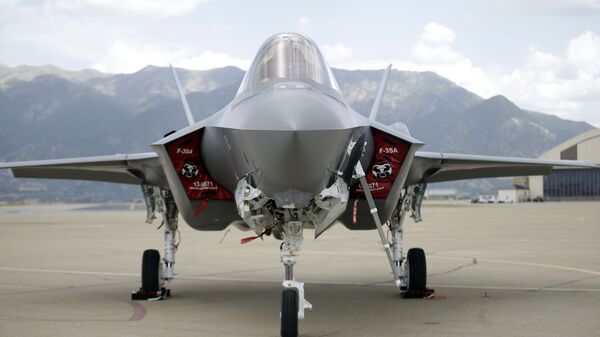US Republican Senator Lindsey Graham said that the US hopes to bring Turkey back into a joint production programme for F-35 jet fighters.
“I hope that we will be able to establish more strategic relations with Turkey, try to return them to the F-35 programme, maybe we will talk about the free trade programme,” said Graham.
He noted that Turkey is "a very important ally, not only when it comes to Syria, but for the entire region”. At the same time, the American ambassador to Ankara, David Satterfield, announced the US plans to submit a proposal to reduce customs duties on aluminium and steel to Turkey. The move could increase the volume of trade between the two countries to $100 billion.
Retired Turkish Air Force Lieutenant-General Erdogan Karakus and political analyst Ceyhun Bozkurt commented on the American statement.
According to Karakus, the reason why Washington backtracked on the issue of the F-35 programme is that the United States fears finally losing such an important strategic ally as Turkey.
“Turkey is demonstrating a firm resolve on the issue of creating a security zone in the territories east of the Euphrates. Moreover, the Americans are well aware that Turkey’s purchase of the S-400 will not lead to a data breach on the F-35. Therefore, they took this step to smooth out tensions in relations with Ankara. There are several levels of interest. Thus, America wants to bring trade with Turkey to the level of $100 billion. Furthermore, the US does not want to completely lose such an important strategic ally as Turkey due to F-35. By preserving Turkey in the framework of the F-35 programme and selling it Patriot systems, Washington hopes to keep it within a certain framework concerning further actions east of the Euphrates,” Karakus explained.
Pointing to the US desire to maintain good relations with Turkey for its interests in the Middle East, Karakus concluded:
“Since America has failed to talk Turkey out of operations in the area east of the Euphrates, it is at least trying to convince the latter of the need to implement a limited plan to creating a five-mile security zone.”
Turkish political analyst Ceyhun Bozkurt also believes that such actions by America are connected with the desire to prevent Turkey’s active actions on Syrian territory. Meanwhile, according to him, even the possible warming of relations between Ankara and Washington will not be able to change the position of Turkey regarding the territories east of the Euphrates and the security zone.
“If you look at the big picture, the United States is fast approaching to lose Turkey as its ally. It is increasingly moving away from the US and is moving closer to Russia and the Asian world. The price of completely losing such an important geostrategic player in the Eurasian region as Turkey is incredibly high for the US. In this case, the balance of power will change in favour of the Asian world. Therefore, the United States was forced to back down to prevent such a scenario. Another question is what exactly is behind the statements of the American side. This question can be answered after the details become clear,” said Bozkurt.
Determining the focal point of the current situation, Bozkurt believes that Turkey will take a balanced approach in any case:
“The important point is that even if Turkey goes to strengthen relations with the United States in this context, it will not spoil relations with the Eurasian countries but will continue its policy of maintaining balance based on its experience. This situation will not change Ankara’s position regarding the territories east of the Euphrates and the creation of a security zone. Washington is also aware of this determination by the Turkish side. In general, it can be assumed that new processes will begin to occur in the region in late September or early October. This is indicated by the increased F-16 flights and increased activity at the border,” he concluded.

